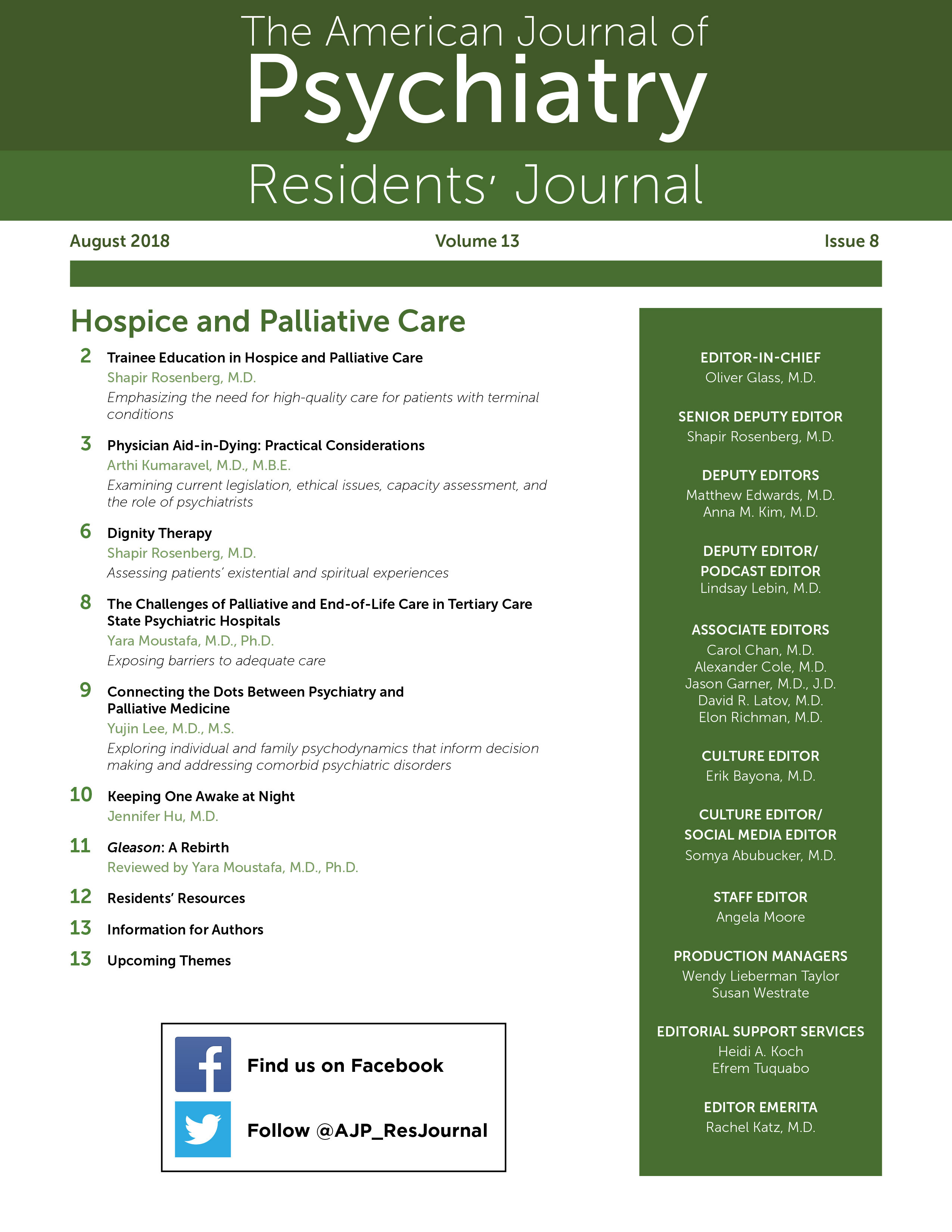Dignity therapy is an evidence-based and clinically effective psychotherapeutic modality for patients who are classified as terminally ill (
1). Illnesses that are irreversible may lead to loss of autonomy, severe physical pain, and challenging existential and spiritual experience, all of which contribute to disintegration of a patient's sense of self (
2,
3) and sometimes suicidal ideation (
4) or a desire for a hastened death (
4). Dignity therapy is a unique, noninvasive, and practical (
5) therapeutic tool that can be beneficial for patients with end-stage illness.
Harvey Chochinov, a Canadian psychiatrist who specializes in palliative care, is widely credited with putting forth the theory behind—and the practice of—dignity therapy (
6). Dignity is typically synonymous with terms such as self-esteem, self-worth, and self-respect. It is arguably a complex and multifactorial concept involving aspects such as physical independence, cognitive acuity, self-pride, and autonomy (
6). Early studies (
7) suggested that among patients with terminal conditions, there is an association between the undermining of dignity and psychiatric symptoms relating to anxiety and depression, including worry and guilt and a sense of hopelessness and worthlessness. Moreover, loss of a sense of meaning, feelings of burdening others, spiritual distress, and loss of dignity were all found to correlate with patients' requests for hastened deaths (
4,
7). It is believed that existential distress experienced by dying patients, manifesting as various cognitive and affective states and by the symptoms mentioned above, threatens both the meaning given to life and the coherence of one's sense of personhood. Dignity therapy strives to address these problems.
Dignity therapy is a brief, individualized intervention designed to engender a sense of meaning and purpose among patients with terminal illness, thereby reducing distress in this patient population. At its core, it offers patients an opportunity to speak about issues that matter to them most as well as about aspects of their lives they wish to be remembered. As a first step, the Patient Dignity Inventory, a 25-item screening tool, may be used to assess various aspects of end-of-life distress and may be administered as a post hoc gauge of the effectiveness of palliative interventions for terminal illness (
8).
To engage in dignity therapy, a clinician can set aside one or more uninterrupted blocks of time during which the patient is provided a comfortable, safe, and private space. The clinician then surveys the patient by asking questions designed to elicit salient aspects of the patient's life history, accomplishments, and meaningful roles. Other key elements of dignity therapy include inquiring about the patient's stated hopes and dreams, as well as instructions and advice, for his or her offspring and about how the patient wishes to be remembered. With permission obtained from the patient, the interviews are recorded and then written to the satisfaction of the patient, such that they may serve as legacy documents that survive the death of the patient. The documents are reviewed by the surviving family members after the patient's death and can be passed on to subsequent generations who wish to learn about the patient's life.
Among patients with life-limiting illnesses, providing a formal opportunity for these patients to speak about their life accomplishments and the roles they have occupied enables them to sustain a feeling of an intact essence, despite advancing, irreversible illness and loss of autonomy (
7). Their participation in the process of dignity therapy may contribute a sense of hope and meaning as life draws to a close.
Participation in dignity therapy necessarily involves patients and health care providers who have adequate time, space, and means to engage in this intervention. Patients who are nonverbal or unconscious or those with severe cognitive limitations, such as advanced dementia or severe delirium, are unable to participate. Further studies are needed to elucidate whether terminally ill patients with specific disease types (oncologic, cardiac, renal, pulmonary, neurologic, etc.) or in specific age cohorts (pediatric, adult, geriatric) benefit more or less significantly in certain domains—for example, on measures of spiritual distress, autonomy, and death anxiety—and what, if any, aspects of dignity therapy should target specific groups. For example, a pediatric patient facing death may benefit less from therapy aspects pertaining to life review than an elderly patient who has lived many decades.
Terminal illness and the concomitant loss of a sense of purpose, selfhood, autonomy, and meaning present great challenges for patients, families, and clinicians. Dignity therapy offers a clinically meaningful way to restore and promote essential yet fragmented or eroded elements of the self and yields creative documents that survive the death of the patient.
Key Points/Clinical Pearls
